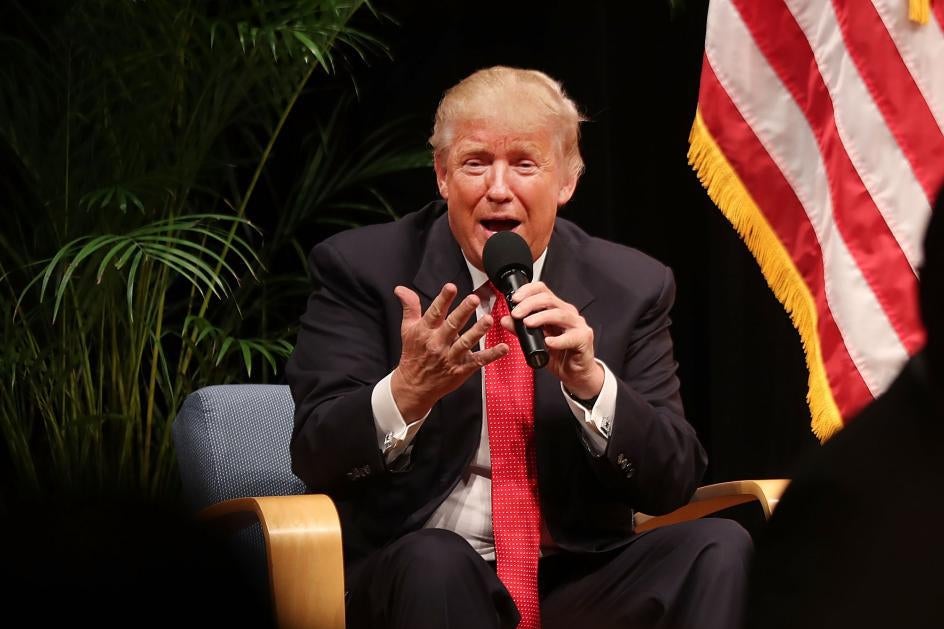If there were an Advent calendar of Donald Trump’s shortcomings for the months leading up to the election, “lifelong disgust for women’s bodies” would be behind this week’s little door. Since Monday’s presidential debate, conversations about Trump have centered on his pathological urge to evaluate and criticize the weight and shape of women he encounters as he goes about his day.
We’ve known this about Trump for years, but Hillary Clinton brought it to the fore on Monday night, when she pressed the candidate on his history of calling women pigs, slobs, and dogs. One high-profile target of Trump’s verbal abuse, Clinton noted, was Alicia Machado, the 1996 Miss Universe winner whom Trump nicknamed “Miss Piggy” and “Miss Housekeeping.” After her win, the Venezuelan pageant winner gained weight; Trump, displeased, forced the then-20-year-old to work out in front of a cabal of gawking reporters. In a video for the Clinton campaign, Machado says she struggled with eating disorders for years after Trump’s nasty stunt.
Trump could only stammer “Where did you find this?” and “Oh, really?” while Clinton recounted his humiliation of Machado during the debate, in which he also made fun of an imaginary computer hacker who “weighs 400 pounds.” But the morning after, Trump addressed Clinton’s remarks in the most ludicrous way: He doubled down on his misogyny, protesting to Fox and Friends that Machado did gain “a massive amount of weight,” so it was actually “a real problem.” (Newt Gingrich echoed that sentiment.) In the past few days, we’ve also learned that Trump would watch the contestants eat and tell them to suck their stomachs in, and when he visited his L.A.-area golf club, managers would schedule the thinnest, most conventionally pretty hostesses to work because Trump would often suggest they fire any less attractive hostesses he saw.
In response, people are starting to reflect Trump’s obsession with looks back at his own imperfect form. Sen. Claire McCaskill of Missouri, a reliable fighter for women’s health and rights, tweeted that she and the other Democratic women in the Senate were worried for the candidate. “We’re concerned about Donald’s weight,” she wrote on Wednesday. “Campaign stress? We think a public daily weigh-in is called for.” This week’s New Yorker cover shows Trump as a losing beauty pageant contestant, his thick neck and pudgy thighs emerging from a spangled leotard. Last month, an artist’s collective erected a series of unflattering statues of a naked, tiny-dicked Trump in several cities around the U.S., his spider veins and protruding gut exposed to the world in silicone and clay.
These slights are hardly worse than what Trump’s said and done to people he’s encountered just in the past year of his presidential campaign, and it’s hard to feel any sympathy for a man so totally inured to the effects of his persistent cruelty. We saw it with Trump’s prolonged, senseless smear of the Khan family, and we’re seeing it now: No matter how many people condemn his heartlessness, he refuses to back down. Whether he’s too proud to apologize or too dense to see his offense doesn’t really matter.
So it feels really, really good to insult Trump’s appearance. Nothing else gets to him! He’s proud of his lack of knowledge of every single aspect of the presidency. He lies when confronted with literally anything objectionable he’s said in the past. His ego is so grotesquely engorged, no appeals to reason or political decorum can puncture it. But people know he cares about physical appearance more than he cares about almost anything else, so they go there. Over the course of Trump’s campaign, jabs at his appearance have been used as shorthand for everything else that’s wrong with him. I struggle to recall a presidential candidate so openly and widely mocked for his looks by respectable lawmakers and publications, not just the sexist idiots, tabloids, and comics we’d expect. Serious, reputable journalists—including some at this online magazine—have repeatedly mocked his skin tone, hair, and hands, even as we’ve insisted in piece after piece that a person’s appearance should have no bearing on his or her qualifications for a job.
Yes, Trump has made a big deal about the respective sizes of his hands and penis, so some might say those are fair game. But stooping to Trump’s level doesn’t just hurt him. When McCaskill takes a shot at Trump’s weight, even in reference to his own bullying, she’s reminding all of us that fat people are less worthy of our respect. Making fun of Trump’s allegedly miniature penis, as the New York City Department of Parks and Recreation did, is demeaning to plenty of awesome, lovable people with small penises. Mimicking Trump’s appearance-based insults justifies his lowest-of-the-low mode of campaigning, too. “If they can do it,” I imagine his worst supporters thinking, “why can’t we?”
When we return Trump’s fat-shaming with more fat-shaming, we elevate fat-shaming as a valid form of political and social criticism more than we do anything to discourage Trump. This is why, when women espouse vile misogyny and help rehabilitate the reputations of serial molesters, we don’t mock their looks and shame them for their sexual history—we defend them from Donald Trump’s sexist remarks. It’s why, when gays actively work to undermine the lives of their fellow queers, we don’t lob slurs at them and condemn them to hell—we call them self-hating, expose them as hacks, and work to make sure they don’t ever win an election. If Trump succeeds in reducing our political discourse to petty insults about weight and penis size, no matter if he ever garners an office, he will have won.
